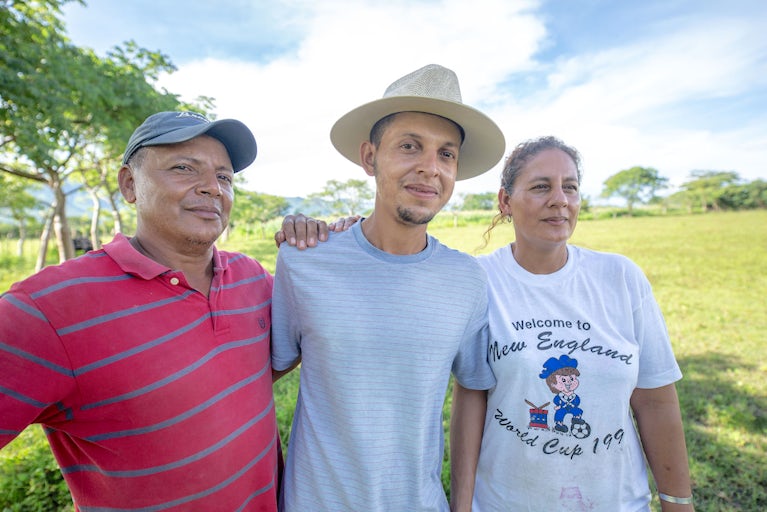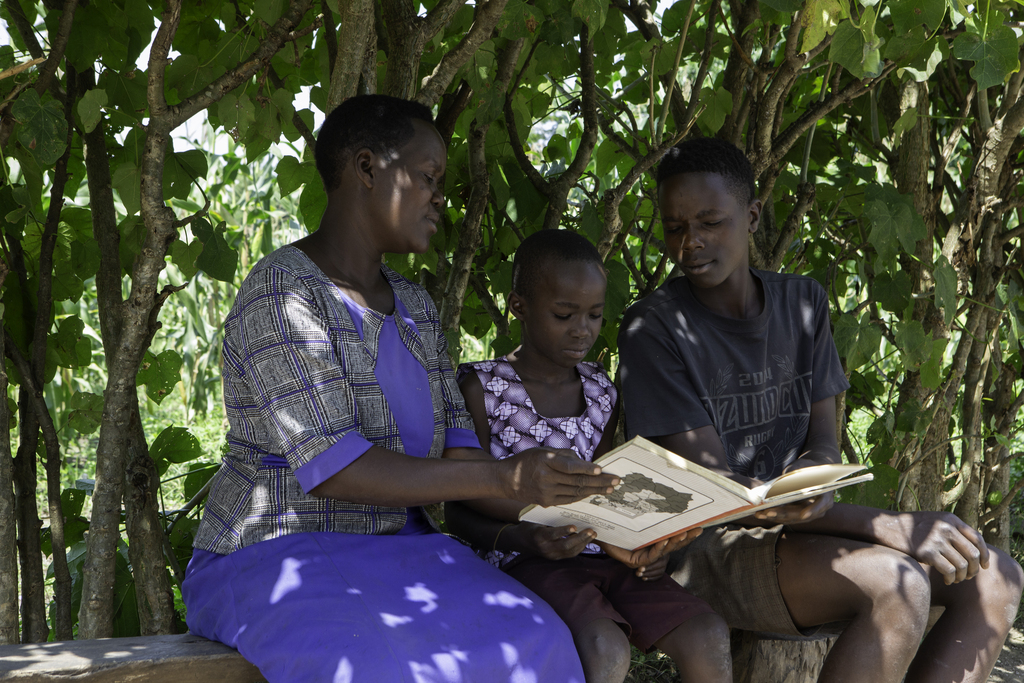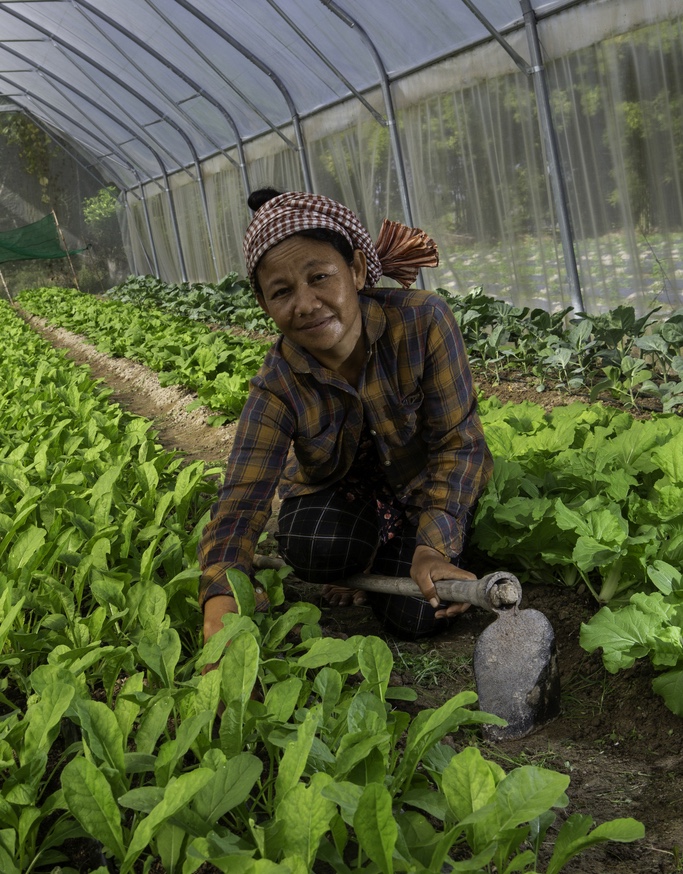From Honduras to Uganda to Cambodia
August Impact Story

Honduras
Luis grew up on his family farm in a remote region of Honduras, where they struggled to get by. Luis tried to improve his station in life by attending university, but financial troubles forced him to drop out.
He then made the tough decision to return home so he could farm and practice agriculture alongside his parents. Unfortunately, while Luis labored hard to care for their cattle, he was unable to earn enough to truly achieve security and success.
But through generosity of Heifer supporters like you, Luis was able to join the Leveraging Success project in Honduras — which proved to be a turning point for him and his family. Through this project, Luis learned how to care for and make money with honeybees — the bees YOUR generosity helped to provide!
With these bees and training came honey… and hope! Luis and his fellow farmers learned, worked and increased productivity, providing enough to both feed their families and sell for additional income. And Luis’ success led to him being selected as a promoter for his cooperative, allowing him to impart his knowledge onto others in the community, helping lift them all up.
Even with all of this success, Luis has never lost sight of his ultimate goal — returning to school and completing his education.
 Uganda
Uganda
Catherine Agwang has faced many worries throughout her life the Dokolo District of North Central Uganda, from war and rebellion to famine and drought. The oldest of seven, Catherine remembers bathing and feeding her younger siblings and her inability to go far in her schooling for reasons ranging from war to poverty.
Her hardships continued into marriage, as it fell to her to do all the cooking and cleaning for every man in the family she married into — on top of caring for her children in the era of The Lord’s Resistance Army.
“I had to carry my child and run while pregnant to an anthill where I slept alone with the baby,” she says.
As their family continued to grow, they faced difficulty feeding their children and affording medical care. Their crops provided minimal sustenance for themselves and not enough to make a stable living off of, which harmed their ability to pay school fees for their children.
That all changed when Catherine joined the Heifer-supported Kwera Youth Oil Seed Farmer’s Cooperative, a 185-member group that pools resources to help farmers buy and sell at better prices and gain leverage in negotiations. By purchasing expensive, high-quality seeds in bulk, the cooperative makes them available to its members at significantly more affordable prices.
Through the co-op Catherine received high-quality maize and soybean seeds, and the training on how to successfully raise her crops, like how to prepare the soil properly and plant at the right time. With guidance from the group, her crops began to thrive!
In addition to the cooperative, Catherine joined a small savings group where farmers contribute money weekly and can borrow from the fund to help their businesses. At the end of the year, members receive their savings plus interest from group loans. Catherine used her share to buy additional high-quality sunflower seeds to help diversify her crops for additional income that she can now use to pay her children’s school fees.
For Catherine the advantage of the group goes beyond the actual savings and loan segment.
“Being in a group has made me better at public speaking because when you’re in a group you’re able to speak to your friends, so I am now able to communicate in public functions,” she says.
Now, Catherine’s first goal is to see all her children educated to a high level. Her second goal is to construct a new house, with the current house serving as a new trading center. She already uses multiple rooms now to store some of her produce. But she isn’t complaining — when she looks back on the hardship she’s faced, she’d rather have to use space for storage than not have it at all.
Cambodia
For years, Chan Phally tried to produce vegetables without any technical knowledge in her home of Kan Yuor village, which is part of Cambodia’s Kampong Chhnang province. The result was inconsistent harvests, constant pest damage and modest earnings.
“I truly relied on the ground, the soil by itself,” she said. “I would just put seeds in the ground and hope that it would grow.” It was hardly enough to survive, let alone plan for the future.
Opportunity arrived in 2021, when Phally joined the Melum Samaki Rongroeung Agriculture Cooperative. Led by Heifer Cambodia, the program is transforming small-scale vegetable farming by introducing climate-smart practices, market access and financial tools to help farmers build sustainable, reliable livelihoods.
Through the cooperative, Phally secured a net house along with an irrigation system that delivers water straight to the roots. She also learned to use compost-based fertilizer and natural pesticides, along with advanced cultivation techniques such as starting seedlings in trays before transplanting them to the soil.
“With the net house, I am sure that when I grow the vegetables, anything I [plant] there will grow,” she said. “And because of that guarantee, it gives me hope already.”
Before joining the cooperative, Phally carried water to her fields by hand. Now, irrigation pipes inside her net house deliver a steady flow from her well, saving her time and physical strain.
The changes have had an immediate financial impact. In just four months, Phally has more than doubled her previous income. She now sells bok choy, white carrots, spinach and cauliflower to traders who come to her farm.
With her increased earnings, she buys food, covers costs to power her irrigation pump and makes offerings at Buddhist ceremonies, a customary practice to honor her faith.
Her rising income and involvement in the program are also making the possibility of selling produce directly at a formal market a tangible goal.
Phally’s aspirations extend to helping her daughter and the broader community; she contributes monthly to a local self-help savings group, to help other farmers invest in protective structures and improved vegetable management.
“My hope when I joined … was that the money they get from me and other farmers they would use to help other people as well, to pass on to each other,” she said.
For years, Phally’s life was shaped by uncertainty. Now, standing in the green rows of her farm, she sees something greater: Growth that reaches beyond her own land.
“I want my community to develop,” she said. “My community won’t develop unless we all have a better livelihood.”
